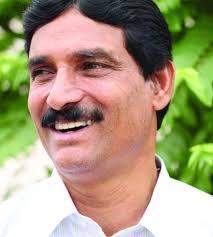
Popatrao Pawar
Hiware Bazar is a village in Ahmednagar District of Maharashtra, India. A resident, Raosaheb Rauji Pawar, recalls how things were in the village about 50 years ago: “We lived in a poor village, but were happy with our simple lives. But, after the drought of 1972, the peace was shattered. People became irritable and restless as the struggle to stay alive became severe. Petty reasons were enough to trigger-off bitter quarrels, as there was so much despair and frustration. Villagers started consuming liquor and it added to our ruin. Many residents migrated to nearby cities to work as daily wage labour.”
There was a collapse of the economic and social systems. A large number of the residents migrated to cities looking for jobs. At that time, the Panchayati Raj (Local Self-Government) law was being implemented and a sarpanch or village leader had to be elected. The villagers, especially the youth that remained, persuaded Popatrao Pawar, the only postgraduate in the village, to contest the election held in 1989. Though at first reluctant to take up the responsibility, Pawar took up the challenge and led a complete transformation of the village.
First, Pawar got the 22 liquor shops of the village closed and arranged bank loans for the poor families including those who were brewing illicit liquor earlier. The loans were meant to help them take up farming and livestock production.
Next, Pawar turned to water conservation. He got the villagers to harvest rainwater by constructing 52 earthen bunds, two percolation tanks, 32 stone bunds and nine check dams. He used state government funds for the material, but got the villagers to contribute free labour. Apart from cutting costs this approach also ensured quality work. The result of rainwater harvesting was immediate: After the first monsoon, the irrigation area increased from 20 ha to 70 ha. Subsequently much more land was brought under cultivation.
Water use is measured and budgeted; optimal cropping patterns are prescribed and enforced. Students at the local school undergo a compulsory course on water management. In 2007, the village won the National Award for community-led water conservation.
Soon farming became a full-time and profitable activity. In 1995, 168 of its 182 families were below the poverty line (BPL). By now, all are above the BPL. In fact, Pawar has introduced a stricter definition of poverty level. The village defines a BPL family as one that cannot have two full meals a day, cannot pay for children’s education and afford healthcare. Hiware Bazar has reversed the migration – nearly 100 families that had migrated to cities have returned to the village and are prospering there.
Pawar and the panchayat have introduced many reforms and changes such as the following:
- Planting trees and regenerating the local forest.
- Harvesting gum from trees as a commercial activity.
- Provision for education and marriage expenses of the second daughter in a family.
- More women representation in the village council.
- Collective farming with voluntary contribution of labour.
- Reducing grazing by cattle and growing of fodder.
- Fully functioning school.
- Elimination of open defecation.
- Adoption of family planning.
- Use of solar energy
- Going fully organic in farming.
Community participation has been the key to Hiware Bazar’s success. People decided what they wanted and came up with feasible plans. There was also transparency in the financial transactions. All expenditure was audited.
Pawar was named made chairman of Maharashtra’s Model Village Programme that aims to create 100 villages like Hiware Bazar. It took 20 years to transform his village, but Pawar wants to use his experience to change other villages in two years.

Very inspiring – shows what good and honest leadership can achieve!
Sincerity of purpose by a person from a simple background has made all the difference to the community. So long as people or the community can have faith in its leadership, transformation is certain. Faith in leadership gets established based on the concerns shown by the leadership in the day to day difficulties of the common man. The list of reforms are an indication of what people seek to find comforts in life at the basic level. Kudos to Popatrao Pawar, may his tribe increase.